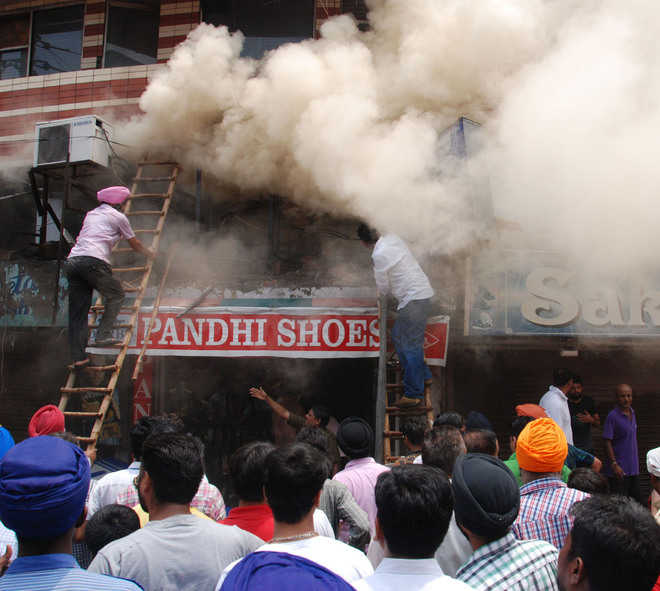Monday’s fire breakout caught disaster management wings off guard
Neeraj Bagga
Tribune News Service
Amritsar, July 5
The fire breakout at a commercial establishment in a densely populated market in the walled city yesterday exposed the unpreparedness of various wings of disaster management.
The traffic police and the Municipal Corporation miserably failed to work in tandem as traffic chaos ruled the roost. Disaster Management expert Surjit Sharma said there was a high need for various departments to synergise their working to achieve the common goal of mitigating the losses to men and material in case of any man-made or natural disaster.
He stated that the precedence like yesterday’s showed serious chinks and gaps in preparedness to launch a rescue operation. He added that these gaps needed to be plugged as soon as possible.
There was a traffic chaos at Katra Jai Mal Singh Chowk, where the fire had broken out at a shoe shop and on roads around it. People were stuck while there was no space for any vehicle, even for reinforcement of firemen and fire brigade to swiftly reach the spot.
Experts say there are many loopholes and gaps in meeting man-made and natural disasters. Already, Amritsar has been classified in a sensitive seismic zone.
Precautionary movement of vehicles on these roads should have been stopped to de-congest the area. However, it was not done, despite the fact that traffic cops were deployed at every nook and corner of these roads, keeping in view the heavy flow of traffic on the road leading to the Golden Temple and returning from there.
Already, the fire brigade here is crying for proper infrastructure and manpower.
A disaster management expert Surjit Sharma said Diwali was round the corner, but there were many vulnerable areas which needed to be secured to avoid any untoward incident.
He suggested that the district administration must keep a group of skilled and trained volunteers ready to meet any natural and man-made disaster. They must be ready to work like a well-oiled machine during such eventualities. It would curtail the response time to a disaster, which is vital to salvage men and material in such instances of distress.
Completely stuffed shops, in densely populated areas, remain vulnerable to fire accidents. However, shopkeepers are rarely prepared for such exigencies, despite having loads of combustible material.
Disaster Management experts suggest that shopkeepers must keep cardboard boxes and other combustible material away from their shops. In addition, they must keep sand bags, water buckets, battery operated tube lights in their shops to tackle a fire breakout any time.
High footfall would be noticed at religious places, the bus stand, the railways station, prominent public places and others. However, little precaution seems to have been taken to douse any wayward flame at these places.
Fuel stations in the city are invariably highly vulnerable to fire accidents. The city has as many as 400 petrol pumps, which are required to set up ample fire-safety methods, so as to tackle any mishap.
However, fire-safety measures are not taken up on priority at most of these places. As per norms, fuel station owners are required to arrange two fire extinguishers for each of the fuelling machines installed at the station. Most of the fuel stations do not have the required number of fire extinguishers. Compounding the problem, attendants at these stations do not know how to operate the fire extinguishers.
When an Amritsar Tribune team quizzed employees at a couple of filling stations, it came out that fire safety drills had never been held and they were not trained to handle the situation in case of an accident.
Even as many fire breakouts have occurred at godowns, factories, shops in the city every year, it has taught little to shopkeepers to invest in fire-fighting systems. Their sole dependence in the case of such an accident is a government-run fire brigade.










